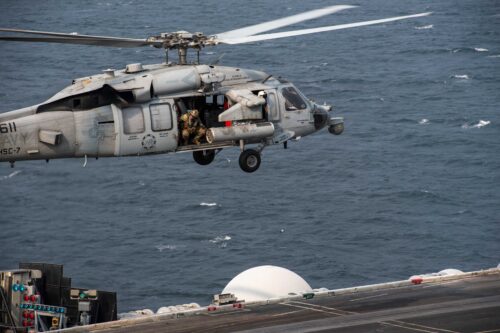The fragile maritime security in the Red Sea shattered once again as US Navy helicopters sank three Houthi boats in a tense encounter after they attempted to board a Singapore-flagged container ship. The incident marks a significant escalation in the ongoing conflict between the Houthis and US-backed coalition, raising concerns about potential wider repercussions.

The Maersk Hangzhou, owned by Danish shipping giant Maersk, was initially targeted on Saturday around 5:30 PM GMT. Maersk confirmed the vessel was “hit by an unknown object” but stressed there was “no indication of fire on board.” Despite sustaining no reported damage, the attack prompted Maersk to temporarily suspend operations through the Red Sea.
However, early Sunday morning, four Houthi boats approached the ship with mounted weapons and small arms, attempting to board it within 20 meters. The ship’s crew issued a distress call and, according to the US military, fired back in self-defense.
Helicopters from the nearby USS Eisenhower and USS Gravely responded to the distress call and, after being fired upon, sank three of the Houthi boats, killing their crews. The remaining boat fled the scene. Although no US personnel or equipment were harmed, the incident marks the first time the US Navy has directly engaged Houthi fighters in the Red Sea since the recent attacks began.
Houthi officials claim the ship refused warning calls and that 10 of their fighters were killed or missing. They have repeatedly justified their attacks on Red Sea vessels as retaliation for the ongoing Israeli offensive in Gaza, despite targeting ships from various nations and often with tenuous links to Israel.
This latest clash has sparked alarm amongst international shipping companies and raised fears of further escalation in the already volatile region. Maersk’s temporary suspension of operations highlights the ongoing threat to maritime security in the Red Sea.
The recent US-led coalition initiative to protect maritime traffic faces a serious challenge after this incident. While the coalition successfully secured safe passage for over 1,200 merchant ships in the initial days, this attack demonstrates the persistent threat posed by Houthi forces.
The international community is likely to call for both sides to de-escalate tensions and prioritize the safety of civilian vessels navigating the crucial Red Sea shipping lane. With the conflict in Yemen showing no signs of abating and regional tensions simmering, the future of maritime security in the Red Sea remains uncertain.
For more information, hit the Source below